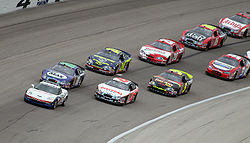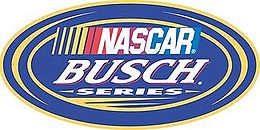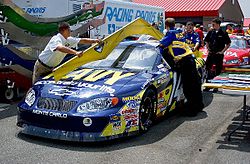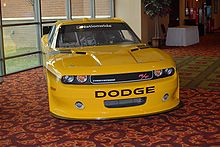- Nationwide Series
-
Nationwide Series 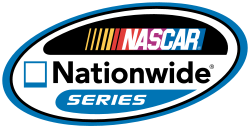
Category Stock car racing Country or region  United States
United States
 Canada
CanadaInaugural season 1982 Teams 40 Constructors Chevrolet
Dodge
Ford
ToyotaLast Drivers' champion Brad Keselowski Last Teams' champion Joe Gibbs Racing Last Makes' champion Toyota Official website Nationwide.NASCAR.com  Current season
Current seasonThe NASCAR Nationwide Series is a stock car racing series owned and operated by the National Association of Stock Car Auto Racing. It is promoted as NASCAR's "minor league" circuit, and is a proving ground for drivers who wish to step up to the organization's "big leagues"; the Sprint Cup circuit. Nationwide Series races are frequently held in the same venue as, and a day prior to, the Sprint Cup race scheduled for that weekend, encouraging fans to attend both events.
The series was previously called the NASCAR Busch Series and the NASCAR Busch Grand National Series. In December 2006, NASCAR officials confirmed that Anheuser-Busch, parent company for Busch Beer, would not renew its sponsorship of NASCAR's No. 2 series after the end of the 2007 Season. On October 3, 2007, it was announced Nationwide Insurance would become the title sponsor beginning with the 2008 season.
Contents
History
The series emerged from NASCAR's Sportsman division, which had been formed in 1950 as NASCAR's short track race division. It was NASCAR's fourth series (after the Modified and Roadster series in 1948 and Strictly Stock in 1949). The sportsman cars were not current model cars and could be modified more, but not as much as Modified series cars.[1] It became the Late Model Sportsman series in 1968, and soon featured races on larger tracks such as Daytona International Speedway. Drivers used obsolete Grand National (now Sprint Cup) cars on larger tracks but by the inception of the touring format in 1982, the series used older compact cars. Short track cars with relatively small 300 cubic inch V-8 motors were used. Drivers used smaller current year models featuring V6 motors.
The modern-day Nationwide Series was formed in 1982, when Anheuser-Busch sponsored a newly reformed late-model sportsman series with its Budweiser brand. The series switched sponsorship to Busch in 1984. It was renamed in 1986 to the Busch Grand National Series.
Grand National was dropped from the series' title in 2003 as part of NASCAR's brand identity (the Grand National name was now used for the Busch East and Winston West series as part of a nationwide standardization of rules for NASCAR's regional racing). Following the 2007 season, Anheuser-Busch, makers of the Busch brand of beer, said they would not renew their contract with NASCAR. In 2008 Nationwide Insurance became the title sponsor of the "NASCAR Nationwide Series".[2]
The Nationwide sponsorship is a seven-year contract, which coincides with NASCAR's current broadcast contract with ABC/ESPN. The Nationwide sponsorship does not include the banking and mortgage departments of Nationwide. The sponsorship reportedly carried a $10 million commitment for 2008, with 6% annual escalations thereafter.[3] In addition to the direct cost of sponsorship, Nationwide has made an additional commitment of between $4 million and $5 million in advertisement buys on ESPN.
International markets
On March 6, 2005, the Series held its first race outside the United States, the Telcel-Motorola 200. The race was held in Mexico City, Mexico at the Autodromo Hermanos Rodriguez, a track that has held Formula One and Champ Car races in the past. It was won by Martin Truex Jr. On August 4, 2007, the Series held its second race outside of the United States, at the Circuit Gilles Villeneuve in Montreal, Quebec, another road course. It was won by Kevin Harvick, while Quebec native Patrick Carpentier finished second. In July 2008 NASCAR announced that the Nationwide Series would not return to Mexico City's Autodromo Hermanos Rodriguez in 2009.
Television broadcasting
United States
Since 2007, ESPN2 as well as ABC and ESPN have been the exclusive carrier of all Nationwide Series races, replacing Fox, FX, TNT and NBC. Some sponsors have criticized the new television deal, noting only four (six in 2007) races will appear on broadcast network television (through a branding deal on ABC); in recent years, as many as ten races in the Nationwide Series have aired on network television. Most of the races on ABC were chosen so ESPN2 could air major sporting events. However in 2011, SPEED Channel has gained rights to the Spring Richmond race ending ESPN's exclusivity of the Nationwide Series. ESPN will still air the 33 other races with only four races (Las Vegas, Iowa, Charlotte, Michigan) being shown on ABC.
Latin America
The Nationwide Series is available in most Latin American countries on cable and satellite TV. Since 2006, 'SPEED Latin America' carries live coverage of all events. The races are also shown on Fox Sports Latin America, some of them live and some tape-delayed depending on the network's schedule. Televisa Deportes also broadcasts a 30-minute recap every Sunday morning on national television in Mexico.
Australia
Network Ten's additional high-definition service, ONE, began broadcasting races from the Nationwide Series live or near live during the 2008 season. Previously, broadcasts of the series were carried on the Fox Sports pay TV channel.
Canada
All races are live on TSN HD or TSN2 HD using ESPN's coverage. Races that are aired on TSN2 are usually re aired on TSN late night after the race.
Buschwhackers
Main article: BuschwhackerSince the early days of the Nationwide Series, many Sprint Cup drivers have used their days off to drive in the Nationwide Series. This can be for any number of reasons, most prominent or often claimed is to gain more "seat time", or to familiarize themselves with the track. Examples of this would be the first ever winner of a Nationwide Series race, Dale Earnhardt, and the winner of the most races in Nationwide Series history, Kyle Busch.
In recent years, this practice had been termed "Buschwhacking" by those who criticize it. The colloquialism originated from the words "Busch" and "bushwhacker" during the days when Anheuser-Busch was the main sponsor of the series but it has gradually fallen out of use since Nationwide took over as title sponsor.
Critics claim that Sprint Cup drivers racing in the Nationwide Series takes away opportunities from the Nationwide Series regulars, usually younger and less experienced drivers. On the other hand, many fans claim that without the Sprint Cup stars and the large amount of fan interest they attract, the Nationwide Series would be inadequate as a high-tier division. Many Nationwide Series drivers, however, have welcomed the Cup drivers because it gives them the opportunity to drive with more seasoned veterans.[4]
In 2007, the Sprint Cup Series began racing with the Car of Tomorrow, a radically new specification different from the Nationwide Series. Sprint Cup drivers have admitted that driving the Nationwide car the day before the race does not help much with the Sprint Cup race because the cars drive so differently. This may change with the new Nationwide Series car making its debut in the July 2010 Daytona race. This car has a set-up closer to the current Cup car and some Cup drivers who have tested the car say it has similar handling characteristics. The new car goes full time in the 2011 season. In 2007, six out of the top ten drivers in the final point standings were Cup regulars, with Jason Leffler being the only non-Cup driver in that group to win a race in '07. This number decreased from 2006 when 8 out of 10 drivers were Cup regulars. The decreased number is attributed to Cup regulars running only partial schedules, allowing for more Nationwide regulars to reach the top ten in points. However, the 2006, 2007, 2008, 2009, and 2010 champions were all Cup regulars driving the full series schedule (Kevin Harvick, Carl Edwards, Clint Bowyer, Kyle Busch, and Brad Keselowski). As a result, starting with the 2011 season, NASCAR implemented a rule that stated that a driver could only race for the drivers' championship in one of three national series (Sprint Cup, Nationwide, and Camping World Truck) of the drivers' choosing.
Nationwide Series cars
Comparison with a Sprint Cup Car
With the advent of NASCAR's Car of Tomorrow, Nationwide Series cars have become very different from their Sprint Cup Series counterparts, the main differences being a slightly shorter wheelbase (105" instead of 110"), 100 pounds less weight, and a less powerful engine. In the past, Nationwide Series competitors could use makes of cars not used in the Cup series, as well as V-6 engines instead of Cup's V-8s.
In the early '80s, teams were switching from the General Motors 1971–77 X-Body compact cars, with a 311-cubic inch engines. Later, teams were using General Motors 1982–87 G-body cars. Ford teams have used the Thunderbird cars consistently.
In 1989, NASCAR changed rules requiring cars to use current body styles, similar to the Sprint Cup cars. However, the cars still used V6 engines. The cars gradually changed to cars similar to Cup cars.
In 1995, changes were made. The series switched to V-8s with a compression ratio of 9:1 (as opposed to 14:1 for Cup at the time). The vehicle weight with driver was set at 3,300 pounds (as opposed to 3,400 for Cup). The body style changes, as well as the introduction of V-8s, made the two series' cars increasingly similar.
The suspensions, brake systems, transmissions, are identical between each series. The Car of Tomorrow does eliminate some of these similarities. The Car of Tomorrow is taller and wider than the current generation vehicles in the Nationwide Series and utilizes a front splitter opposed to a front valance. The Car of Tomorrow has also been setting pole speeds slower than the Nationwide Series cars at companion races.[5]
Previously, Nationwide Series cars used fuel that contained lead. NASCAR conducted a three-race test of unleaded fuel in this series that began with the July 29, 2006 race at Gateway International Raceway. The fuel, Sunoco GT 260 Unleaded, became mandatory in all series starting with the second weekend of the 2007 series, as Daytona was the last race weekend with leaded fuel.
Another distinction between the cars became clear in 2008. NASCAR had developed rain tires for road course racing in both series, but never had to use them in race conditions. The program was abandoned by the Sprint Cup Series in 2005, but the Nationwide Series continued to use rain tires in races at Autodromo Hermanos Rodriguez and Circuit Gilles Villeneuve could not be planned with rain dates. When rain started to fall at the 2008 NAPA Auto Parts 200, the tires were given their first laps under race conditions.[6]
Specifications
- Chassis: Steel tube frame with safety roll cage, must be NASCAR standards.
- Engine Displacement: 5.8 L (5,800 cc) (358 in³) Pushrod V8.
- Transmission: 4 Speed Manual.
- Weight: 3,100 lb (1,406 kg) Minimum (without driver); 3,300 lb (1,497 kg) Minimum (with driver).
- Power Output: 650–700 hp (485–522 kw) unrestricted, ≈450 hp (335 kW) restricted.
- Torque: 700 N·m (520 ft·lbf).
- Fuel: 98 octane unleaded gasoline provided by Sunoco.
- Fuel capacity: 18 US gal (68 L).
- Fuel delivery: Carburetion.
- Compression ratio: 12:1.
- Aspiration: Naturally aspirated.
- Carburetor size: 390 ft³/min (184 L/s) 4 Barrel.
- Wheelbase: 105 in (2,667 mm).
- Steering: Power, recirculating ball.
- Tires: Slick tires and rain tires provided by Goodyear.
- Length: 208 in (5,283 mm).
- Width: 72.5 in (1,842 mm).
- Height: 51 in (1,295 mm).
- Safety equipment: HANS device, Seat belt 6-point supplied by Willans.
Nationwide "Car of Tomorrow" (CoT)
The NASCAR Nationwide Series unveiled its "Car of Tomorrow" (CoT) at the July 2010 race at Daytona International Speedway. Before being fully integrated in the 2011 season, it was also used in 2010 races at Michigan International Speedway, Richmond International Raceway and Charlotte Motor Speedway.[7] The body and aerodynamic package is different than the Sprint Cup Series cars.[8] The Nationwide CoT has important differences from the Sprint Cup CoT, and the current Nationwide car. The Nationwide CoT shares its chassis with the Sprint Cup CoT, but not the body because its wheelbase has been extended to 110 inches (2794 millimeters).
The body also has differences between each manufacturer, but still within strict aerodynamic guidelines provided by NASCAR. The Chevrolet car body resembles the Impala, the Dodge body the Challenger, the Ford body the Mustang and the Toyota body the Camry.[9]
Manufacturer representation
Budweiser Late Model Sportsman Series (1982–1983)
- Chrysler
- Dodge Challenger: 1982
- Ford
- Ford Fairmont: 1982–1983
- General Motors
- Chevrolet Nova: 1982–1983
- Oldsmobile Omega: 1982–1983
- Pontiac Ventura: 1982–1983
Busch Grand National Series (1984–2003)
- Chrysler
- Dodge Intrepid: 2002–2003
- Ford
- Ford Fairmont: 1984–1986
- Ford Thunderbird: 1987–1997
- Ford Taurus: 1998–2003
- Mercury Cougar: 1984
- General Motors
- Buick Regal: 1985, 1988–1991
- Buick LeSabre: 1986–1989
- Chevrolet Monte Carlo: 1986–1988, 1995–2003
- Chevrolet Nova: 1984–1988
- Chevrolet Lumina: 1989–1995
- Oldsmobile Omega: 1984–1987
- Oldsmobile Delta 88: 1986–1993
- Pontiac Ventura: 1984–1987
- Pontiac Grand Prix: 1988–2003
Busch Series (2004–2007)
- Chrysler
- Dodge Intrepid: 2004
- Dodge Charger: 2005–2007
- Ford
- Ford Taurus: 2004–2005
- Ford Fusion: 2006–2007
- General Motors
- Pontiac Grand Prix: 2004 (No factory Support)
- Chevrolet Monte Carlo: 2004–2005
- Chevrolet Monte Carlo SS: 2006–2007
- Toyota
- Toyota Camry: 2007
Nationwide Series (2008–Present)
- Chrysler
- Dodge Charger: 2008 – 2010
- Dodge Challenger: 2010 – Present (COT Races) (no factory support)
- Ford
- Ford Fusion: 2008 – 2010
- Ford Mustang: 2010 (COT Races)2011– Present
- General Motors
- Chevrolet Monte Carlo SS: 2008
- Chevrolet Impala SS: 2009 (no factory support)
- Chevrolet Impala: 2010 – Present (All Races) (no factory support)
- Toyota
- Toyota Camry: 2008 – Present
Past champions
Nationwide Series Champions
- 2010 Brad Keselowski (Owners Championship -#18 Joe Gibbs Racing)
- 2009 Kyle Busch
- 2008 Clint Bowyer (Owners Championship- #20 Joe Gibbs Racing)
Busch Series Champions
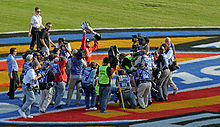 Carl Edwards celebrating his 2007 Busch Series championship
Carl Edwards celebrating his 2007 Busch Series championship
- 2007 Carl Edwards (Owners Championship – #29 Richard Childress Racing)
- 2006 Kevin Harvick
- 2005 Martin Truex, Jr.
- 2004 Martin Truex, Jr.
Busch Grand National Series Champions
- 2003 Brian Vickers (Owners Championship – #21 Richard Childress Racing)
- 2002 Greg Biffle
- 2001 Kevin Harvick
- 2000 Jeff Green
- 1999 Dale Earnhardt, Jr.
- 1998 Dale Earnhardt, Jr.
- 1997 Randy LaJoie
- 1996 Randy LaJoie
- 1995 Johnny Benson
- 1994 David Green
- 1993 Steve Grissom
- 1992 Joe Nemechek
- 1991 Bobby Labonte
- 1990 Chuck Bown
- 1989 Rob Moroso
- 1988 Tommy Ellis
- 1987 Larry Pearson
- 1986 Larry Pearson
- 1985 Jack Ingram
- 1984 Sam Ard
Budweiser Late Model Sportsman Series Champions
- 1983 Sam Ard
- 1982 Jack Ingram
Late Model Sportsman Division Champions
- 1981 Tommy Ellis
- 1980 Morgan Shepherd
- 1979 Gene Glover
- 1978 Butch Lindley
- 1977 Butch Lindley
- 1976 L. D. Ottinger
- 1975 L. D. Ottinger
- 1974 Jack Ingram
- 1973 Jack Ingram
- 1972 Jack Ingram
- 1971 Red Farmer
- 1970 Red Farmer
- 1969 Red Farmer
- 1968 Joe Thurman
Sportsman Division Champions
- 1967 Pete Hamilton
- 1966 Don MacTavish
- 1965 Rene Charland
- 1964 Rene Charland
- 1963 Rene Charland
- 1962 Rene Charland
- 1961 Dick Nephew
- 1960 Bill Wimble
- 1959 Rick Henderson
- 1958 Ned Jarrett
- 1957 Ned Jarrett
- 1956 Ralph Earnhardt
- 1955 Billy Myers
- 1954 Danny Graves
- 1953 Johnny Roberts
- 1952 Mike Klapak
- 1951 Mike Klapak
- 1950 Mike Klapak
Nationwide Series Rookie of the Year Award winners
- 2010 Ricky Stenhouse Jr.
- 2009 Justin Allgaier
- 2008 Landon Cassill
- 2007 David Ragan
- 2006 Danny O'Quinn Jr.
- 2005 Carl Edwards
- 2004 Kyle Busch
- 2003 David Stremme
- 2002 Scott Riggs
- 2001 Greg Biffle
- 2000 Kevin Harvick
- 1999 Tony Raines
- 1998 Andy Santerre
- 1997 Steve Park
- 1996 Glenn Allen, Jr.
- 1995 Jeff Fuller
- 1994 Johnny Benson
- 1993 Hermie Sadler
- 1992 Ricky Craven
- 1991 Jeff Gordon
- 1990 Joe Nemechek
- 1989 Kenny Wallace
Nationwide Series Win table
Through the 2011 Dollar General 300 Miles Of Courage on Saturday May 14, 2011.[10]
- Indicates active driver.
See also
- 2011 NASCAR Nationwide Series
- List of auto racing tracks in the United States
- List of Nationwide Series champions
- List of NASCAR Nationwide Series champions
- List of NASCAR teams
- List of NASCAR drivers
- Sprint Cup Series
- Camping World Truck Series
External links
- NASCAR Nationwide Series official site
- NASCAR Nationwide Series page on nationwide.com
References
- ^ The Busch Series dilemma
- ^ Nationwide Insurance to be sponsor of No. 2 Series
- ^ NASCAR Scene, October 11, 2007, Vol. XXXI — No. 24, p32
- ^ Speedwaymedia.com "The Dangers of Bushwhacking" Retrieved May 23, 2009
- ^ NEXTEL Cup race with pole speed listed Busch Series race with pole speed listed
- ^ Thatsracin.com "NASCAR races in the rain in Montreal". Retrieved January 23, 2009.
- ^ "Yahoo! Canada Sports — Sports News, Scores, Rumors, Fantasy Games, and more". Ca.sports.yahoo.com. http://ca.sports.yahoo.com/nascar/news?slug=ap-nascar-nationwide-newcar&prov=ap&type=lgns. Retrieved 2010-07-13.
- ^ Mark Aumann (2007-10-28). "COT planned for 2009 Nationwide Series debut — Oct 28, 2007". Nascar.Com. http://www.nascar.com/2007/news/headlines/bg/10/28/nationwide.cot.2009/index.html. Retrieved 2010-07-13.
- ^ "Yahoo! Canada Sports — Sports News, Scores, Rumors, Fantasy Games, and more". Ca.sports.yahoo.com. http://ca.sports.yahoo.com/nascar/news?slug=nascar_com-retro.racing.nationwide.new.car-20091031&prov=nascar_com&type=lgns. Retrieved 2010-07-13.
- ^ [1]
National Association for Stock Car Auto Racing (NASCAR) Chairmen & presidents National racing series Regional/local racing series K&N Pro SeriesK&N Pro Series West · K&N Pro Series EastWhelen ModifiedWeekly Short Track RacingSpecial eventInternational series NASCAR CanadaNASCAR MexicoCorona Series · Mini StocksNASCAR AustraliaOnline Racing Series NASCAR iRacing SeriesFormer series AutoZone Elite DivisionOther SeriesTelevision & radio CBS · Fox · NBC · ESPN/ABC · TNT · Hot Pass · SPEED
MRN Radio · Performance Racing Network · IMS Radio NetworkDaytona 500 · Chase for the Sprint Cup · Seasons in Review
Tracks · Rules & Regulations · Safety in NASCAR · Car of Tomorrow
Drivers · Teams · Fatalities · Hall of Fame · Sprint Cup Series Champions · Nationwide Series Champions · Camping World Truck Series Champions · All-time Cup Winners · Rookie of the Year · Triple Threat Winners
Buschwhacker (Double Duty Performers) · Road Course Ringers · Lore · Canada · Mexico · Video Games · FamiliesNASCAR Nationwide Series seasons Races in the NASCAR Nationwide Series Current Season Daytona • Phoenix • Las Vegas • Bristol • California • Texas • Talladega • Nashville • Richmond • Darlington • Dover • Iowa • Charlotte • Chicagoland • Michigan • Road America • Daytona • Kentucky • Loudon • Nashville • Indianapolis • Iowa • Watkins Glen • Montreal • Bristol • Atlanta • Richmond • Chicagoland • Dover • Kansas • Charlotte • Texas • Phoenix • Homestead
2012 Season Daytona • Phoenix • Las Vegas • Bristol • California • Texas • Richmond • Talladega • Darlington • Iowa • Charlotte • Dover • Michigan • Road America • Kentucky • Daytona • Loudon • Chicagoland • Indianapolis • Iowa • Watkins Glen • Montreal • Bristol • Atlanta • Richmond • Chicagoland • Kentucky • Dover • Charlotte • Kansas • Texas • Phoenix • Homestead
Previous Darlington 2 • Martinsville 1 • Martinsville 2 • Martinsville 3 • Martinsville 2006 • Mexico • Myrtle Beach • Nashville USA • Nazareth • Pikes Peak • Rockingham 1 • Rockingham 2 • Milwaukee • Memphis • Gateway 1 • Fontana 2 • Gateway 2 •
Note:The Nationwide Series has multiple events at the same racing venue.NASCAR Nationwide Series race venues Current Atlanta • Bristol • California • Charlotte • Chicagoland • Darlington • Daytona • Dover • Indianapolis (LOR) • Iowa • Kansas • Kentucky • Las Vegas • Loudon • Miami • Michigan • Montreal • Nashville • Phoenix • Road America • Richmond • Talladega • Texas • Watkins GlenFormer Asheville • Caraway • Gateway • Greenville-Pickens • Hickory • Langley • Lanier • Louisville • Martinsville • Memphis • Mexico City • Milwaukee • Motor Mile • Myrtle Beach • Nashville • Nazareth • North Wilkesboro • Orange County • Oxford Plains • Peach State • Pikes Peak • Road Atlanta • Rockingham • South Boston • VolusiaNationwide Series Drivers' Champions 1982 J. Ingram
1983 S. Ard
1984 S. Ard
1985 J. Ingram
1986 L. Pearson
1987 L. Pearson
1988 T. Ellis1989 R. Moroso
1990 C. Bown
1991 B. Labonte
1992 J. Nemechek
1993 S. Grissom
1994 D. Green
1995 J. Benson1996 R. LaJoie
1997 R. LaJoie
1998 D. Earnhardt, Jr.
1999 D. Earnhardt, Jr.
2000 J. Green
2001 K. Harvick
2002 G. Biffle2003 B. Vickers
2004 M. Truex, Jr.
2005 M. Truex, Jr.
2006 K. Harvick
2007 C. Edwards
2008 C. Bowyer
2009 K. Busch2010 B. Keselowski
Categories:- NASCAR Nationwide Series
Wikimedia Foundation. 2010.

